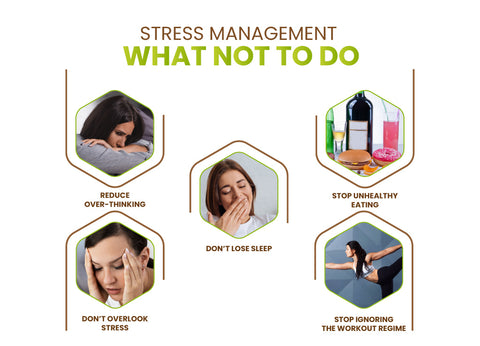
Stress management: What to do and what not
Overview: Stress
Stress is a disturbing feeling of enthusiasm or actual pressure which ascends after any occasion or thought that causes you to feel bothered, furious, apprehensive, or passionate. It is your body's method of responding to a test of interest. In short, it explodes, stress can be positive, for example, when it assists you with keeping away from risk or fulfill a time constraint. Yet, when stress goes on for a while, it might disturb your wellbeing. Stress for a prolonged period can give rise to numerous physicians and mental issues in your system. Therefore it is essential to manage and overcome this aspect of life.
A person in stress faces a situation in which he is constantly thriving to find comfort or peace and getting more anxious when not meeting the state of equilibrium. At the point when we're worried, our bodies produce the stress hormone cortisol. While stress is a solid reaction in specific circumstances, and cortisol is even helpful in warding off irritation when essential, it's the point at which we persistently focus on that cortisol turns into an issue.
Stress Management: What to do
There are many significant ways and habits that one can adopt to find a state of stress relief.
These prominent stress management techniques can prove for you as great stress busters and help you know what works best for you when you are stressed.
-
Exercise/Yoga

First and foremost, active work can assist with working on your rest. What's more, better rest implies better pressure on the board. It generally improves profound "slow-wave" rest that restores the cerebrum and body. It works like When your body feels better, your brain frequently follows.
Exercise additionally appears to help with your mood. It might be that it invigorates your body to deliver various chemicals like endorphins and endocannabinoids that assist with obstructing torment, further improves sleeping patterns, and steady you. Take care not to practice excessive exercise regime near sleep time, which upsets sleep for specific individuals.
-
Healthy Diet

Diet plays an essential role in stress management. What you eat is how your body will respond to stressful situations & conditions. Following are some impactful foods that can help you in calming down your stress:
It's an elaborate meal that satisfies your hunger and keeps you full for a long time. It relieves stress and anxiety as it is an excellent serotonin booster. Carbs play an essential role in helping the serotonin building blocks cross into your brain, where they might convert into the feel-good hormone; you realize that your stress-induced carb craving makes sense. They highly support the nervous system, have B vitamins and melatonin, and tryptophan, all of which help relax the mind. Steel-cut oats are closest to whole-grain status and provide tryptophan, the amino acid precursor to serotonin. Also, the vitamin B6 found in oats is essential to keep your brain focused and energized.
We can't deny the fact that ashwagandha is the magic herb for the body. It is used for stress relief as it contains properties that might help soothe the brain, lower blood pressure, and alter the immune system. Ashwagandha, as a herb, helps the body resist physical and mental stress. A single root of ashwagandha carries significant benefits in tackling stress, anxiety and improving your mental health by acting down on spiked-up stress hormone ‘cortisol levels. It is calming and relaxing in nature. Consuming it from time to time can instill positive vibes and promote wellbeing. Also, it might work as an excellent sleeping aid too.
Turmeric has been very beneficial and an excellent ingredient for calming stress. It contains the bioactive compound curcumin, which helps in alleviating anxiety and stress. It boosts brain function and serotonin, which is a happy hormone, by reducing stress levels.
Amla, Sea buckthorn, oranges, and lemon contains a significant amount of vitamin C, which helps in lowering cortisol and blood pressure while also giving the immune system a bit of a boost. Citrus fruits are well known to reduce stress and lift the mood. Not only does the high level of vitamin C in citrus fruits boost your immunity, but it is also an excellent stress-busting agent. Vitamin C is quite effective in controlling stress by fighting the two leading causes of stress: increased level of cortisol hormone and increase in blood pressure.
-
Get sound Sleep

A person being under stress is more likely to struggle with sleep. Overthinking and overloading of work leads a person not to be able to take a good rest. Performing the practice that brings you peaceful sleep is the idea that can help you get sound sleep. Doing exercise, practicing meditation, eating healthy food, no to alcohol or nicotine are some impactful activities that can help you get stress-free sleep.
-
Meditation

When you meditate, you might clean up the over-burden that develops each day and adds to your stress.
The enthusiastic advantages of meditation can include:
- Expanding persistence and resilience
- Eliminating negative feelings
- Expanding mindfulness
- Acquiring another viewpoint on upsetting circumstances
- Building abilities to deal with your pressure
- Developing a creative mind and innovativeness
- Zeroing in on the present
-
Give 1-2 hours to your Hobby

Taking out time for yourself is one of the best acts you can do as self-care. Treat yourself to the activities you love and which bring joy to your life. It might be dancing, singing, painting, or anything that makes your heart happy. Giving 1-2 hours of a day to your hobby is the top-tier self-love act for your stress relief.
-
Quality time with friends & family

Spending time with your loved ones makes a big difference. We often forget to cherish and create new memories with our family and friends in this hectic schedule. A peaceful time with them will work as one of the best stress-busters for you and add quality to your mental well-being.
-
Stay Hydrated

Hydration reduces the level of stress in your body. If you are not hydrated, the stress leads to anxiety and migraines. Drink water at regular intervals. Also, you can drink hydrating fruit drinks to keep you fuller and balanced hydration.
Stress Management: What not to do

-
Reduce over-thinking
Over-thinking leads to severe mental trauma when at times, you are already feeling stressed. You should not be focusing on over-thinking the situations and creating a more stressful state of mind. Instead, focus on creating a healthy environment, schedule, and taking frequent rests to avoid stressful situations.
-
Don’t lose sleep
In terms of dealing with stress, people tend to shift themselves to overload themselves with work &, as a result, lose their sound sleep. To function appropriately, one needs to rest and take at least 8 hours of sleep to regulate their brain and body decently. Insufficient amount of sleep also leads to migraines and other health issues.
-
Stop unhealthy eating
-
Caffeine
A lot of caffeine intake increases inflammation and ups your stress hormones (like cortisol and adrenaline). Even if you're among those who don't feel the caffeine jitters, it's still wise to take control of your caffeine intake.
-
Alcohol
The link between depression and alcohol is very well documented & can be seen commonly in this hectic lifestyle. Alcohol disrupts the gut microbiome and increases inflammation throughout the gastrointestinal tract. Consuming alcohol to reduce stress is one of the worst things you can do for your body.
-
Refined sugar
The body doesn’t act well with the person in stress consuming sugary foods. Stressful situations trigger sweet eating cravings, which decrease our body’s capability to deal with stress. Instead of eating adulterated and refined sugar, shift towards consuming organic jaggery.
-
Processed Oils
Processed oils contain trans fats that increase inflammation and disrupt the gut microbiome. It’s always a better option to switch to organic omega rich cold pressed oils.
-
Don’t overlook Stress
The most unfortunate thing that you can do to yourself is ignore your Stress instead of managing it. Avoiding Stress won't cure it. Rather, know the signs of stress and learn to deal with them. Analyze what brings stress in your life and then implement the ways or activities that work best to relieve your stress.
-
Stop ignoring the workout regime
Procrastinating your workout regime will not do any help. To start for something better, you have to become better. Adopting healthy habits refreshes mood and calms down stress—active health results in a happy mind. Wake up, tie up your shoes, give time to your body, and rest will follow up.
Conclusion
Stress Management is a practice of adopting and performing healthy habits and activities that leads you to cure & lower down stress. Stress management is not an overnight process. It is a whole process of changing the state of your mind, which is in a position that leads you to negative & anxious thoughts.
The fact that stress is a continuous part of life, managing it should also be a part. If you are not happy within then, there is nothing that can help. Reducing stress by finding your best alternatives which are your stress busters, is an essential thing to do and achieve to maintain a healthy and happy lifestyle.
FAQs
Medicines are helpful for some things yet typically not intended for stress. A few groups bring sedatives to quiet them down quickly; however, it's better in the long haul to figure out how to deal with your stress through unwinding or stress the board techniques. Be mindful so as not to mistake focus for anxiety.
Yes. If someone is dealing with a constant state of stress, it might lead him to feel depressed and anxious at times and cause serious mental issues.
Yes. Stress can influence you and cause issues, such as having no energy, inconvenience dozing, stomach hurt, chest agonies or snugness in your chest, migraines, the runs, blockage, feeling wiped out, muscle weakness, pressure, and hyperventilating.
Yes. Just know what works as a stress buster to you. Pick those techniques and try to follow them with your day-to-day life.
Comments
Very helpful


